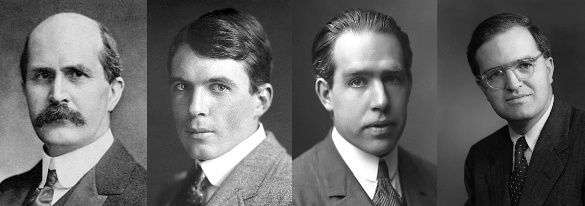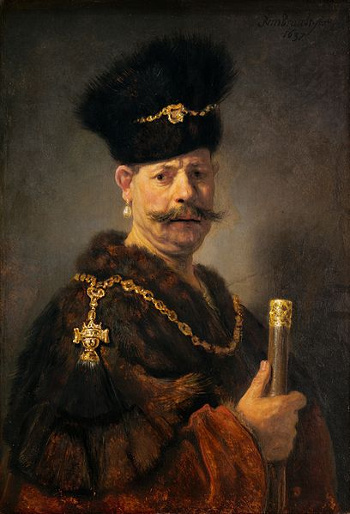Heritability of Social Class
February 23, 2015
It was a fortunate consequence of my choice of
science as a career that
scientists and most other
STEM professionals are paid well for their
employment. My
wife, who was
educated as a
chemist, worked in a
laboratory before
motherhood; and, when our
children were older, she became an
elementary school teacher, likewise reasonably compensated. Such combined
income allowed us to send one child to a
private high school, and to support both children in their
undergraduate and
graduate school educations.
It's safe to say that our children had an advantage over their
peers, and they now have successful
careers of their own. In this way, our children
inherited the
social class of their
parents as well as their parents'
genes. A recent study, published in the
journal,
Human Nature, explores how social status is inherited.[1-2] A
dataset of
educational status in
England from 1170 to 2012 shows that social status is more strongly inherited than
height, and that this
correlation is unchanged over the timespan of those many
centuries.

Heritability in physics. Two sons followed in their father's footsteps by also winning a Nobel Prize in Physics. William Lawrence Bragg shared the 1915 Nobel Prize in Physics with his father, William Henry Bragg; and Niels Bohr was awarded the 1922 Physics Nobel, to be followed fifty-three years later by his son, Aage Bohr, who shared the 1975 Nobel Prize in Physics with Ben Mottelson and James Rainwater. I'm in the academic lineage of William Henry Bragg through George W. Brindley (1905-1983), who received his M.Sc. in 1928 under Bragg at the University of Manchester.[3-4] Brindley subsequently received a Ph.D. from the University of Leeds in 1933. (Source images, left to right, William Bragg, Lawrence Bragg, Niels Bohr, and Aage Bohr, via Via Wikimedia Commons.)
The study
authors used attendance at the two English
universities,
Oxford and
Cambridge, that operated during that extended period. They tracked students with rare English
surnames at these universities, collectively called "Oxbridge," since "Camford" doesn't roll off the
tongue that nicely. They were testing an instance of
nominative determinism in which the name of a person defines his success.
Nominative determinism, as the term normally is used, is the
humorous connection between a person's name and his profession. The term was coined in 1994 by the
British magazine,
New Scientist.[5] Two examples given are Daniel Snowman, who authored a book on the
polar regions, and Richard Trench, who authored a
subterranean guide of
London.
The idea of nominative determinism appears to go back as far as a 1952 paper (Synchronizität als ein Prinzip akausaler Zusammenhänge, Synchronicity – An Acausal Connecting Principle) by
psychiatrist,
Carl Jung, in which he gives examples of a
food minister named Herr Feist (Mr. Stout), and a
lawyer named Herr Rosstäuscher (Mr Horsetrader).[6]
Authors of the study,
Gregory Clark of the
University of California, Davis, and
Neil Cummins of the
London School of Economics, reasoned that they could track the social trajectory of families over those twenty-eight
generations if the families had rare surnames such as Atthill, Bunduck, Balfour, Bramston, Cheslyn, and Conyngham.[2] These families were at the top of the
social ladder in 1066, the time of the
Norman conquest of England; and, even today, they are more likely to be members of the
upper class.[2]
At least in the case of England, there's a
predestination of social class that's continued for centuries, with social status being consistently inherited over multiple generations. The
social mobility of today's England is not that much different from that in
pre-industrial times.[2] The authors conclude that the rate of social mobility in any society can be estimated just by examination the
temporal evolution of two
distributions; namely, that of all surnames, and the surnames of the the elite class.[2] The study suggests an intergenerational correlation in status in the range of 0.70–0.90.[1]
Says economist, Neil Cummins,
“Even more remarkable is the lack of a sign of any decline in status persistence across major institutional changes, such as the Industrial Revolution of the eighteenth century, the spread of universal schooling in the late nineteenth century, or the rise of the social democratic state in the twentieth century... Status persistence measured by education status is just as strong now as in the pre-industrial era.”[2]

Today, as in yesteryear, the one-percenters distinguish themselves by fancy dress. This follows from the principle of "conspicuous consumption," as explicated by economist, Thorstein Veblen (1857-1929).
A 1637 portrait of a
Polish nobleman by
Rembrandt (1606-1669).
The nobleman has been identified as John III Sobieski, King of Poland, but it might be Andrzej Rej, a governor of Libusza. Rej was a diplomat to The Netherlands where Rembrandt lived.
(Via Wikimedia Commons.)
References:
- Gregory Clark and Neil Cummins, "Surnames and Social Mobility in England, 1170–2012," Human Nature, vol. 25, no. 4 (December, 2014), pp. 517-537.
- Joan Robinson, "Family ties that bind: Having the right surname sets you up for life," Springer Press Release, November 17, 2014.
- P. J. Ficalora and G. W. Brindley, "Oxidation of Magnesiowustite Single Crystals: II, Dependence on Temperature, Oxygen Pressure, and Crystal Composition," J. Amer. Ceram. Soc., vol. 50, no. 12 (December, 1967) pp. 662-665.
- Devlin M. Gualtieri and Peter J. Ficalora, "Electron Transfer and Metallic Bonding, The Heats of Reaction of FeAl3-x(Ag; Zn; Pt; Au)x Alloys," High Temperature Science Vol. 7, No. 1 (March, 1975) pp. 25-36. Ficalora was my thesis advisor, and Brindley was his thesis advisor. Alas, since I spent my career in industrial research, I have no academic heirs.
- Tom Colls, "When the name fits the job," BBC, December 20, 2011.
- Carl G. Jung, "Synchronicity: An Acausal Connecting Principle," Bollingen Foundation, Bollingen, Switzerland, ISBN 978-0-691-01794-5 (via Amazon).
Permanent Link to this article
Linked Keywords: Science; scientist; STEM field; professional; employment; wife; education; educated; chemist; laboratory; mother; motherhood; child; children; elementary school; teacher; income; private school; high school; undergraduate education; graduate school; peer group; peers; career; inheritance; inherit; social class; parent; gene; journal; Human Nature; dataset; education; educational; England; human height; correlation; century; heritability; physics; son; father; Nobel Prize in Physics; William Lawrence Bragg; William Henry Bragg; Niels Bohr; Aage Bohr; Ben Mottelson; James Rainwater; academia; academic; lineage; George W. Brindley (1905-1983); Master of Science; M.Sc.; University of Manchester; Doctor of Philosophy; Ph.D.; University of Leeds; Wikimedia Commons; author; university; Oxford; Cambridge; surname; tongue; nominative determinism; humor; humorous; Great Britain; British; magazine; New Scientist; polar region; subterranean; London; psychiatry; psychiatrist; Carl Jung; food; minister; lawyer; Gregory Clark; University of California, Davis; Neil Cummins; London School of Economics; generation; social status; social ladder; Norman conquest of England; upper class; predestination; social mobility; pre-industrial; time; temporal evolution; distribution; Industrial Revolution; 18th century; eighteenth century; state school; universal schooling; 19th century; nineteenth century; social democracy; social democratic state; 20th century; twentieth century; one-percenter; clothing; dress; conspicuous consumption; Thorstein Veblen (1857-1929); portrait; Polish; nobleman; Rembrandt (1606-1669); John III Sobieski; King of Poland; Andrzej Rej; governor; Libusza; diplomat; The Netherlands.